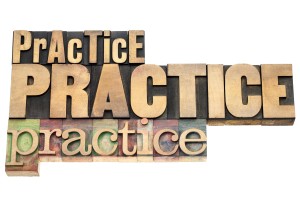English Speaking Skills: Overlearning–You’ll Love the Results
English Speaking Skills: Overlearning–You’ll Love the Results

You’ve heard it: It takes 1000 times of doing a pattern to make a mental trace. And it takes 10,000 times of doing a pattern to make a habit.
“Why do I have to keep practicing? I already have the skill?”
Such is the protest from all of us – child and adult. Cognitive science has a persuasive response: we don’t just need to learn a skill in order to perform it well, but we need to overlearn it. Decades of research have shown that superior performance requires practice beyond the point of mastery. Mastery– perfect performance of a piano concerto or a tennis serve is the marker that the crucial part of the learning is just getting started.
Here’s some clever research. In the Journal of Neuroscience, researcher Ala Ahmed and colleagues in the integrative physiology department at the University of Colorado, Boulder asked study subjects to move a cursor to manipulate a robotic arm. The researchers measured energy expenditure by analyzing how much oxygen the subjects inhaled and how much carbon dioxide they breathed out. At first, they used up a lot of metabolic power. But by the end of the learning process, the effort they used had declined about 20 percent from when they started.
Whenever we learn to make a new movement, Ahmed, explained, we create and then modify an internal model, a “sensorimotor map” which our nervous system uses to predict muscle movements and the resistance they will encounter. As that internal model is refined over time, we can cut down on unnecessary movement and eliminate wasted energy.
Based on the results of the experiments, the researchers theorize that even after participants had fine-tuned their muscle movements, the neural processes controlling the movement continued to grow more efficient. The brain uses up energy and through overlearning it can get by on less. These gains in mental efficiency free up resources for other tasks: you can play music with greater emotion and passion, or keep track of your opponent’s moves on the other side of the tennis court–or with speech, you can do more complex thinking, more voice inflection, and have greater awareness of your communication partner’s responses.
Other studies have demonstrated that for a wide range of academic and professional activities, overlearning reduces the amount of mental effort required, leading to better performance – especially in high-stress situations. For example, research on the “audience effect” shows that once we’ve overlearned a complex task, we perform it better when other people are watching. But when we haven’t achieved the reduction of mental effort that comes with overlearning, the additional stress of an audience makes errors more likely.
The take home message for any skill you are mastering: take every opportunity to practice. You will get better and better and be able to expand outward and combine several skills in a rainbow fashion.
The take home message for clear English speech communication: take every opportunity to practice speaking clear English – both homework-type practice and practice in daily life. You will get better and better. And you will be able to enhance your skill and come off as a great communicator in one-on-one conversations and in presentations. Watch yourself soar like a free eagle in those communication occasions!
Click here: www.cleartalkmastery.com/scheduler to sign up for a Free Sample Lesson with us!
Be sure to watch our English Speech Tips videos and Accent Reduction Tip videos for more English pronunciation and accent reduction exercise.








Leave a Reply